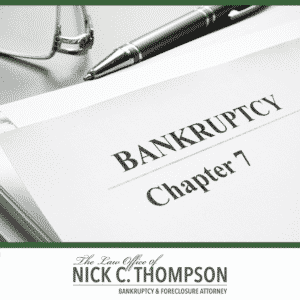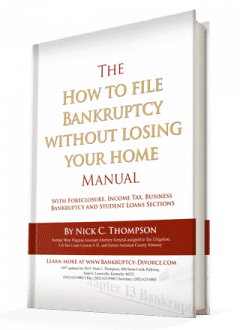Chapter 7 Bankruptcy is best for people with less than $25,000 per person in equity in their home and average or below-average income, and a majority of unsecured debts. Filing Chapter 7 bankruptcy in Louisville can be quick and inexpensive. You can finance filing a Chapter 7 if you have to. That often allows you to get a more experienced attorney. Do you know that you can still file even if you have slightly more equity in property than the exemptions? You can often file if you have more than the average income and 97% of people qualify.
What You Need to Know About Chapter 7 Bankruptcy in Louisville, Kentucky
With Chapter 7, the process is over in approximately four months. Unlike Chapter 13, there are usually no payments to the Trustee. You also don’t have to file a yearly budget, lose your tax refund, or ask permission later to sell or buy a property. Of course, there are also other reasons to choose Chapter 7. Some of those reasons include:
- Over 99% of debtors keep everything they want to keep. It is allowable to keep a substantial amount of property in Chapter 7. People turn over property to the Trustee to get a Chapter 7 discharge less than 1% of the time. When that happens, it’s usually a conscious decision to give up a car to get rid of a million dollars of debt. Nice trade. If you plan the exemptions, you are more able to keep property. But in rare cases you may want to sacrifice an old used auto to discharge large debts unless you don’t want it.
- Chapter 7 Bankruptcy cost less than Chapter 13.
- Chapter 7 Bankruptcy is faster than Chapter 13. The collection calls stop immediately. Many of our Chapter 7 clients have to pick up the phone to see if it’s still working.
- Three different studies show people who file end up with more net worth, better credit, and money in their retirement accounts
Over 97% of Debtors qualify for Chapter 7. However, some law offices don’t look for the deductions from income to allow their clients to qualify. We look for these deductions so our higher-income applicants qualify to file a Chapter 7. Unfortunately, if you don’t look for these deductions, it might force you to file a Chapter 13. Since the attorney makes triple the attorney fee in a Chapter 13, some attorneys don’t look for those deductions. We do.
⎆ Chapter 7 bankruptcy is simple.
Filing for Chapter 7 Bankruptcy is a relatively simple process. Here are the steps you need to take:
- Gather a few standard documents.
- Fill out an intake form.
- Take a counseling class before filing and a debtor education class after filing.
- You go to a hearing about 4-6 weeks after you file which typically lasts less than 5 minutes.
⎆ When is it right to file Chapter 13?
Chapter 13 has special situations in which it is the best choice or the only choice:
- If you have too much disposable income left over for your family size after reasonable expenses you must pay that disposable income into a Chapter 13.
- You can only file one Chapter 7 discharge every eight years. If you recently filed a Chapter 7 a Chapter 13 may be your only option.
- If you need to protect a cosigner a Chapter 13 may be necessary. A Chapter 13 bankruptcy can protect a cosigner. But only a Chapter 13, which repays 100% of the cosigned debt, protects a cosigner.
- Only Chapter 13 has special tools for paying and managing secured, non-dischargeable, or priority debts. These debts are most often taxes, mortgages in foreclosure, and student loan debts.
- Only a Chapter 13 can strip a second mortgage which has no equity. Stripping such a mortgage in a Chapter 13 may be cheaper than paying the mortgage.
- Debtors can file a Chapter 13 if they can’t afford the costs of a Chapter 7 upfront. If you make less than the average income you qualify for a 36 month Chapter 13. If you have a $75-$100 per month payment a Chapter 13 may be more beneficial than a Chapter 7. This still gets you a discharge.
If these situations don’t apply to you then, you probably shouldn’t be in Chapter 13.
⎆ Chapter 7 makes it easy to eliminate unsecured debt.
Bankruptcy increases your net worth by eliminating debt. Filing Chapter 7 bankruptcy is a simple and straightforward way to eliminate most debts, especially unsecured debt. This includes credit card debt, bank loans, medical bills, pay-day loans, and old utility bills. Chapter 7 is designed to give consumers a fresh start while quickly halting creditor garnishments, lawsuits, and harassment.
If they are in default some long-term debts like mortgages and student loans are better managed in a Chapter 13. Income tax penalties and interest can be reduced in a 13 but not in a 7. Residential mortgages can be caught up over time, and second mortgages can sometimes be modified or eliminated. Debts like taxes and mortgages can often be modified or paid back over time. In those cases, you may need to file Chapter 13.
Not all attorneys are created equal — some work to become outstanding in a specific area, such as working with foreclosures and student loans. First, do your homework by reading his reviews. Then, find someone who knows what they are doing if you have foreclosure, student loan, or tax debt.
⎆ You must work with an attorney to get all the benefits.
Every case is different, and filing bankruptcy isn’t like ordering pizza. If a pizza isn’t right, you can blame Papa John’s because you didn’t bake it. It is horrible when the attorney doesn’t know the recipe for the pizza or how to bake it, and unfortunately, some attorneys don’t.
You also have to work together with the attorney to get the bankruptcy done right. He ethically can’t take your Debtor Education class for you. He can’t gather your bank account and other records for the court.
We educate our clients with resources on our website. I take the time to learn your goals and then personally draft petitions with clients to ensure the petition is prepared correctly. I never hand you over to a paralegal. After the Chapter 7 petition filing, the client primarily needs to take the second class and show up in court. But, there are times when a client has to work with use to get some items completed. When we do a redemption to purchase an auto, a loan is reaffirmed, or the client asks us to remove a judicial lien there will be some added work we do together.
⎆ Filing Chapter 7 by yourself is very overwhelming.
The information quickly gets overwhelming and full of complications, so you must plan your goals together and get quality advice. In 2005, when the code changed, half the attorneys quit because it became too difficult. In California, over 90% of the do-it-yourself Chapter 13 cases fail. It’s nearly impossible to find your way without a good attorney who is knowledgeable in this area. So, do not hesitate to give us a call today. We are always available to discuss your case and your options.
One thing is for sure–timing is of the essence! When the bank files foreclosure, they hire an attorney at $250 to $350 per hour. Unfortunately, he gets paid to take your home as quickly as possible. His wages come out of the equity of your home. If you are being sued, do not wait until after they garnish 25% of your wages and attach your home. It takes extra work and expense to remove a judicial lien or go to court to get money back.
Yes, we are often able to get garnished wages or bank accounts funds back. The sooner you file a Chapter 7 or 13, the faster this stops. The sooner you see us about filing, the more options you have. Call today for your free consultation today.
 Resources for Bankruptcy
Resources for Bankruptcy
Louisville Kentucky Bankruptcy Forms
Filing Chapter 7 & Chapter 13 Bankruptcy • Video
Chapter 13 Plan Modifications in Louisville Kentucky • Video
Options to Avoid Foreclosure with Bankruptcy
Student Loan Income-Based Repayment (IBR)
If you are thinking about filing bankruptcy, don’t delay because timing is crucial. I am here to help you. So, contact my office right away to start the conversation. Nick C. Thompson, Bankruptcy Lawyer: 502-625-0905.


